Bahrain
SPIEF 2025 focused on global and regional economic processes, market transformation, new tech, investment climate, financial policy and people
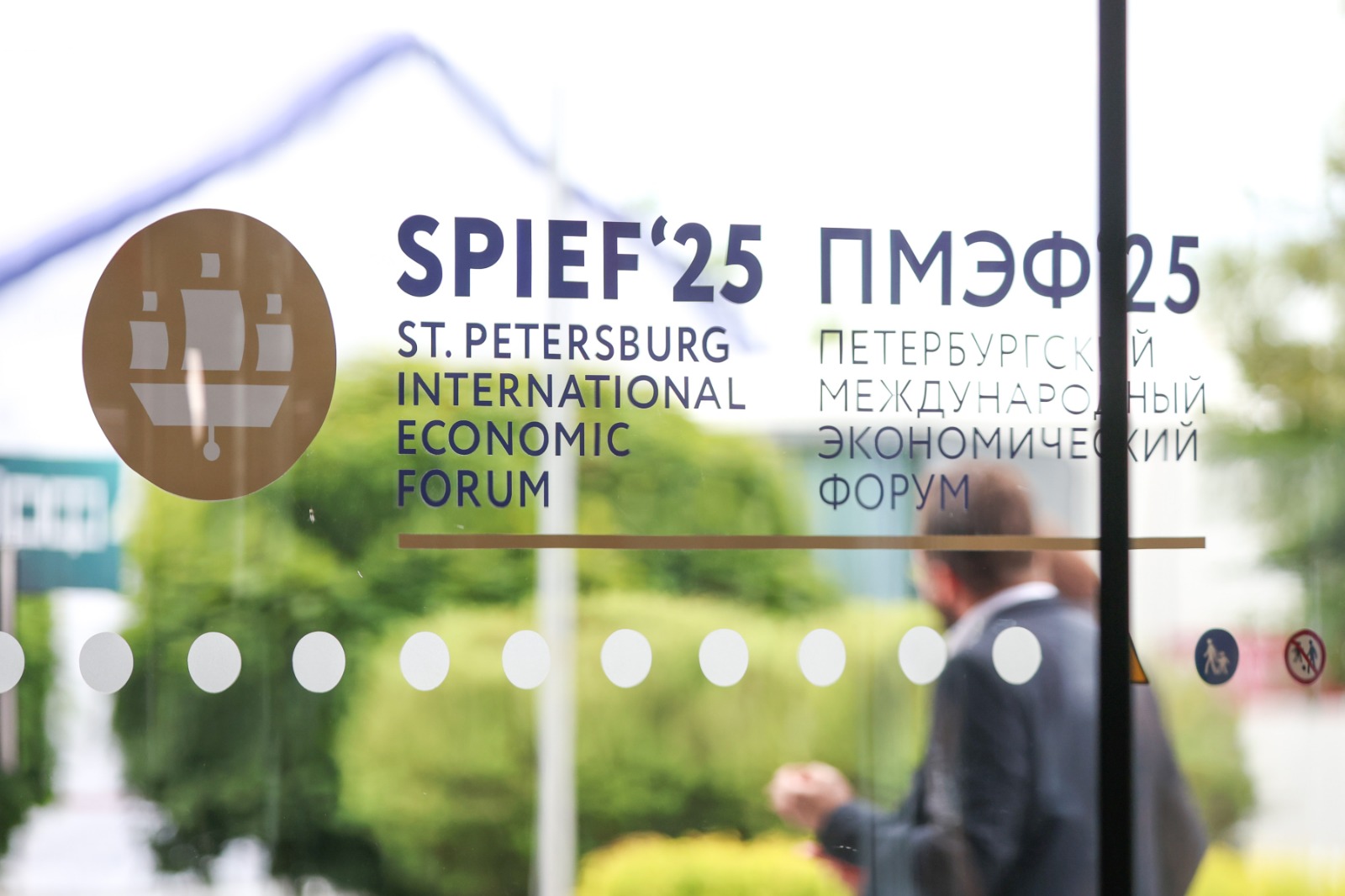
The 28th St. Petersburg International Economic Forum (SPIEF), one of the largest economic events in Russia, has concluded. The SPIEF focused on global and regional economic processes, market transformation, new technologies, the investment climate, financial policy, and people. The Forum is unique in terms of its applicable significance, since it is a platform where practical decisions are made, innovative large-scale projects are launched, real investment agreements are signed, and experts share their experience, forecasts, and strategic initiatives.
The Forum was attended by more than 24,200 participants and media representatives from 144 countries and territories, including Russia. The largest delegations came from Indonesia (over 260), China (250), the UAE (over 120), Bahrain (over 80), and Saudi Arabia (over 80). The BRICS+ format (except Iran) was almost entirely represented, as were all BRICS partner countries. The number of representatives from ASEAN countries increased fourfold.
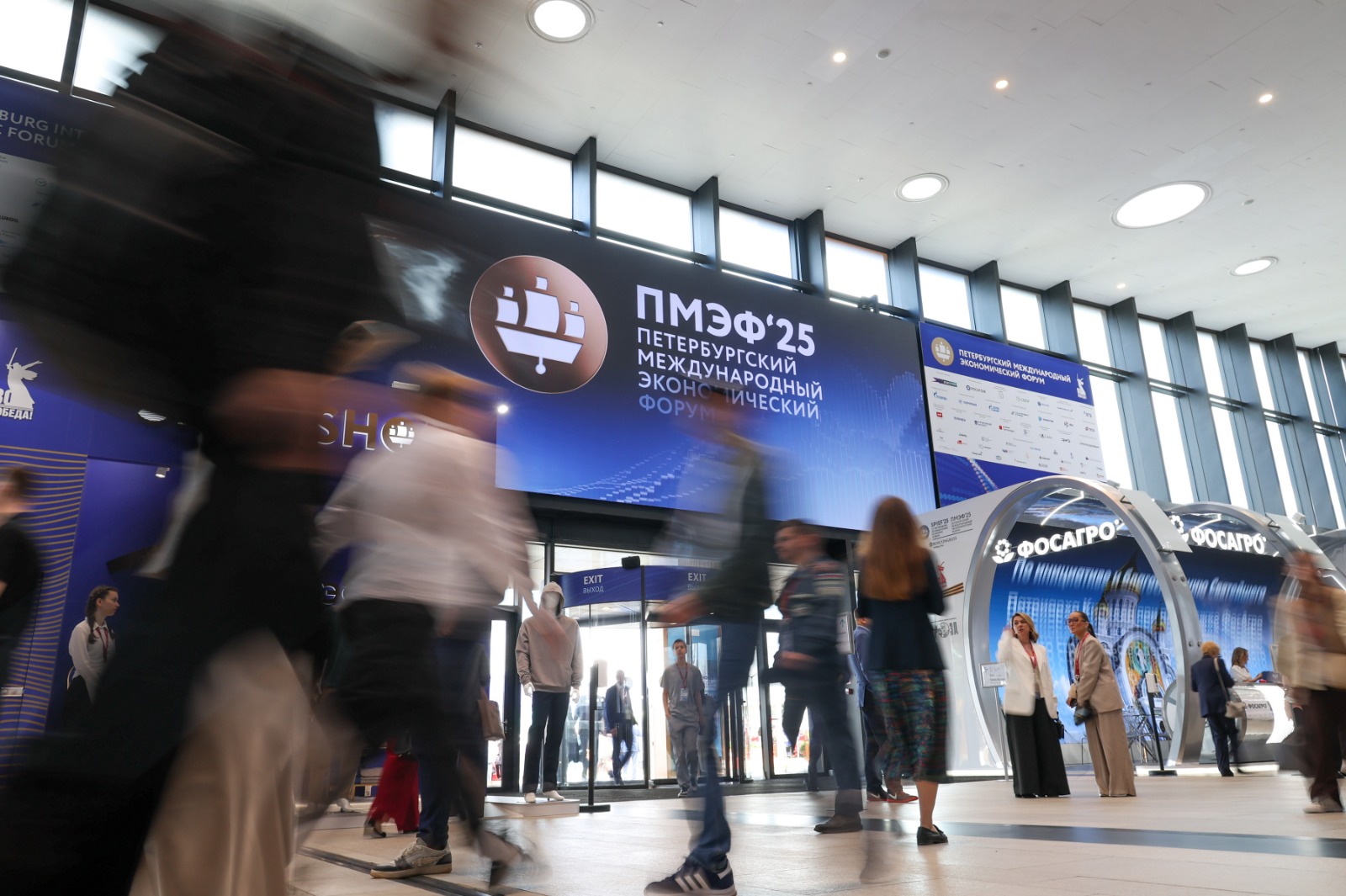
High-ranking officials who attended the Forum included: President of the Republic of Abkhazia Badra Gunba; President of the Republic of Indonesia Prabowo Subianto; Chairman of the Government of the Republic of South Ossetia Konstantin Dzhussoyev; Deputy President of the Republic of South Africa Paul Mashatile; Vice Premier of the State Council of the People’s Republic of China Ding Xuexiang; Personal Representative of His Majesty the King of Bahrain for Charity and Youth Affairs Sheikh Nasser bin Hamad Al Khalifa; Secretary General of the Organization of the Petroleum Exporting Countries (OPEC) Haitham al-Ghais; and Secretary General of the Organization of the Black Sea Economic Cooperation (BSEC) Lazar Comanescu.
In addition, the Forum events were attended by more than 140 high-ranking foreign officials, including deputy prime ministers, ministers of foreign affairs, prosecutors general, and heads of international organizations and associations, diplomatic missions, and different cities and regions around the world.
The Russian side was represented by 38 high-ranking officials, 29 heads of federal services and agencies, and 83 leaders of Russia’s regions.
The Forum brought together about 8,700 representatives of Russian and foreign businesses. It is worth noting that the number of business representatives from the United States increased by almost a third. More than 3,600 Russian companies and 560 companies from other countries were represented at the Forum. It was also attended by some 2,800 senior executives from Russian and other global companies.
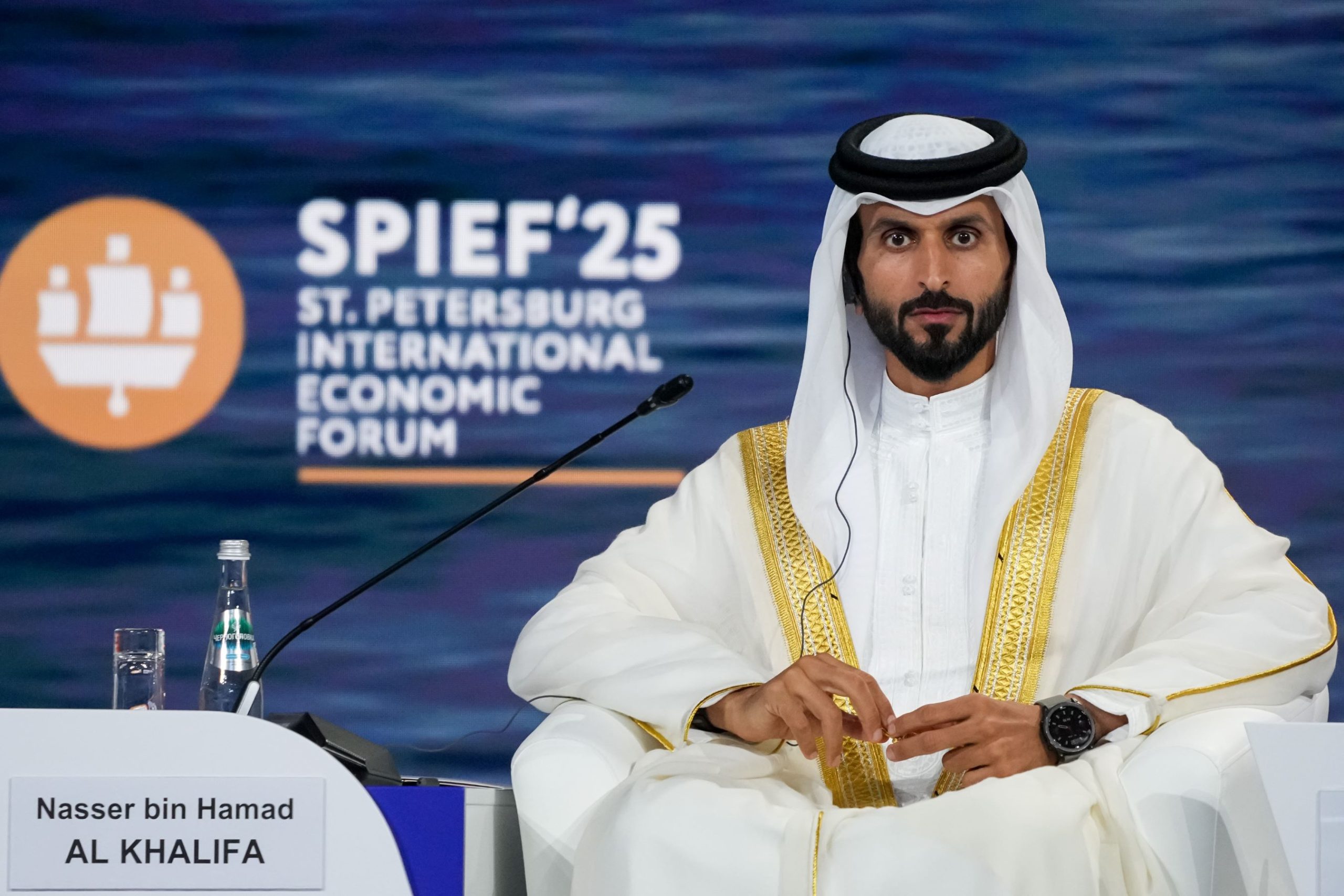
Guest Country
This year, Bahrain was granted the honorary status of the SPIEF guest country. The country’s representative delegation was headed by the son of the ruling monarch and his National Security Advisor His Highness Sheikh Nasser bin Hamad Al Khalifa, Representative of His Majesty the King for Humanitarian Affairs and Youth Affairs and Commander of the Royal Guard. The delegation included about 80 representatives of Bahraini government agencies and the private sector. At the Forum, Bahrain hosted a national pavilion designed to showcase the country’s investment potential in finance, tourism, technology, and sustainable development. At the opening ceremony of Bahrain’s national stand, Bahraini Minister of Industry and Commerce Abdulla bin Adel Fakhro stressed that Bahrain views its participation in the SPIEF as a strategic opportunity to intensify cooperation in such areas as industry, transport, digitalization, food security, and investment.
Agreements Signed
At the Forum, a total of 1,084 agreements were signed for just over RUB 6.481 trillion (this only includes agreements whose amounts are not a commercial secret).
The biggest agreements were:
- NatsProektStroy Group and VEB.RF Development Group signed an agreement on the investment of roughly RUB 1 trillion in the portfolio of specific promising projects during the period until 2030
- Russian Railways and Alfa-Bank signed an agreement on a credit facility with a limit of up to RUB 400 billion that will be used to finance investment projects for the development of railway infrastructure, including the acquisition, repair, and modernization of fixed assets
- The City of St. Petersburg and United Shipbuilding Corporation signed an agreement on the reconstruction of the Severnaya Verf in St. Petersburg. Roughly RUB 300 billion will be invested in the construction of the new shipyard by 2030
- The Krasnodar Territory, Technopromexport (Rostec State Corporation), and the Krymsky District Municipality signed an agreement on the construction and expansion of power units at the Udarnaya Thermal Power Plant. Total investment in the construction and expansion of the plant will amount to more than RUB 200 billion
- The Leningrad Region and IvaMaris signed an agreement valued at RUB 197.7 billion on the construction of a gas chemical plant in the Kingiseppsky District of the Leningrad Region (near the port of Ust-Luga), which aims to strengthen the region’s industrial infrastructure
Plenary Session
The key event of the Forum was the plenary session, which was attended by Russian President Vladimir Putin, President of the Republic of Indonesia Prabowo Subianto, the Representative of the King of Bahrain for Humanitarian and Youth Affairs Sheikh Nasser bin Hamad Al Khalifa, Deputy Premier of the State Council of the People’s Republic of China Ding Xuexiang, and Deputy President of the Republic of South Africa Paul Mashatile.
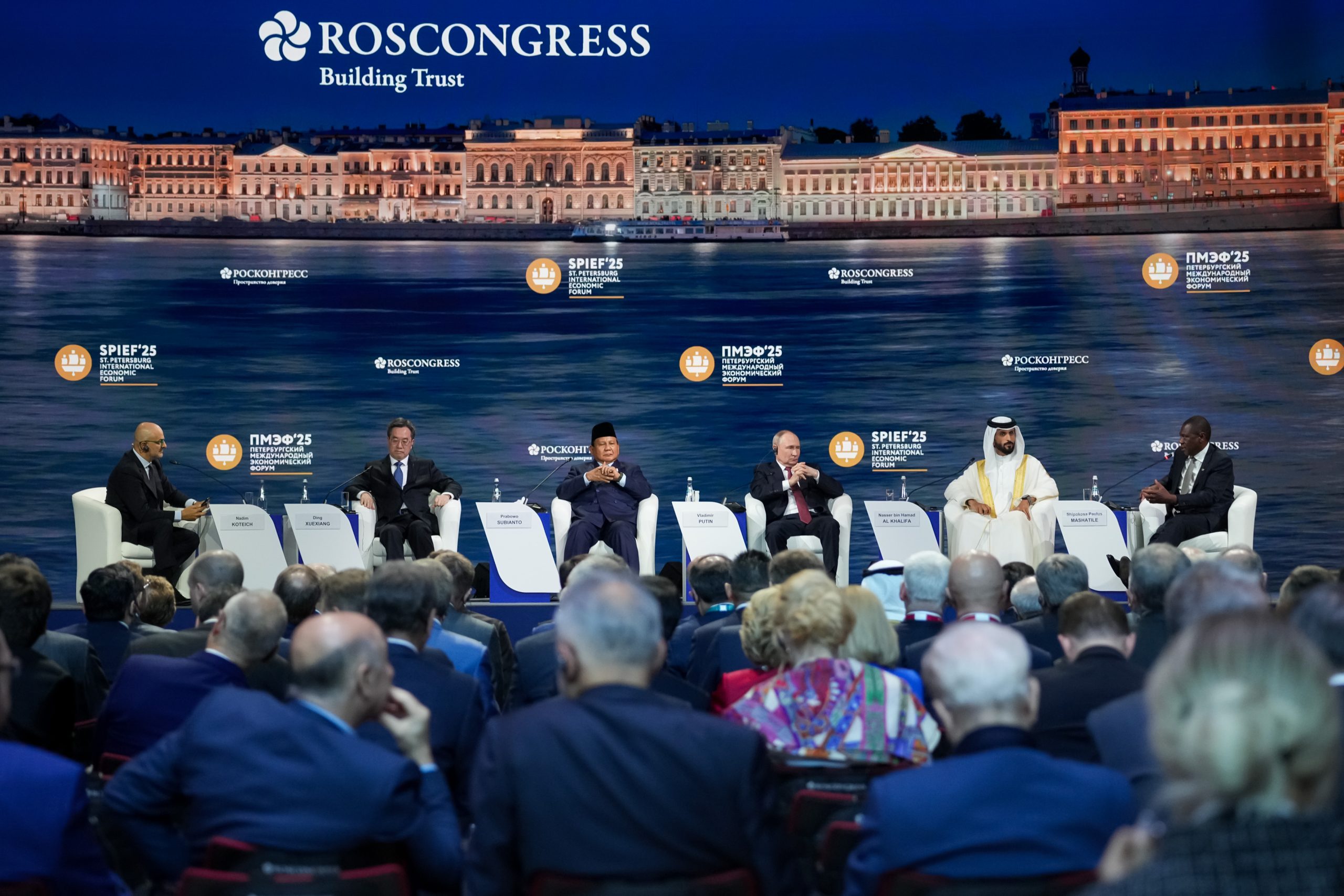
Vladimir Putin spoke about the development of the Russian economy, international economic cooperation, and adaptation to the challenges of a multipolar world. “The global economy is undergoing the most large-scale transformation in recent decades. The countries of the world community are boosting their potential and altering the balance of power and the entire economic picture of the planet. Whereas in the early part of the 21st century, BRICS countries, for example, made up a fifth of the global economy – only a fifth, today they already account for 40% of the global economy. And it is obvious that this proportion will only continue to grow. This is, as they say, a medical fact that will happen inevitably, primarily due to the dynamic states of the Global South,” the Russian president said.
In his speech, Vladimir Putin outlined the key challenge facing the Russian economy: “a new quality of the investment climate”. “Essentially, we are talking about fundamentally minimizing the expenses of business and entrepreneurs in all areas – from construction and the provision of utilities for new projects to day-to-day operational activities, including all types of accounting and notary support,” he said.
Vladimir Putin also emphasized that “the Russian economy must become more technologically advanced.” He said that Russia is offering “a new development model that is free of political manipulation and takes into account the national interests of states.”
Business Programme
The Forum not only served as a meeting place, but also a gathering point for new meanings and solutions, and emphasized a special need for a deep, honest analysis and new models of interaction. In this context, the Roscongress Foundation’s activities were described as a think tank – a structure that shapes a meaningful and long-term intellectual agenda.
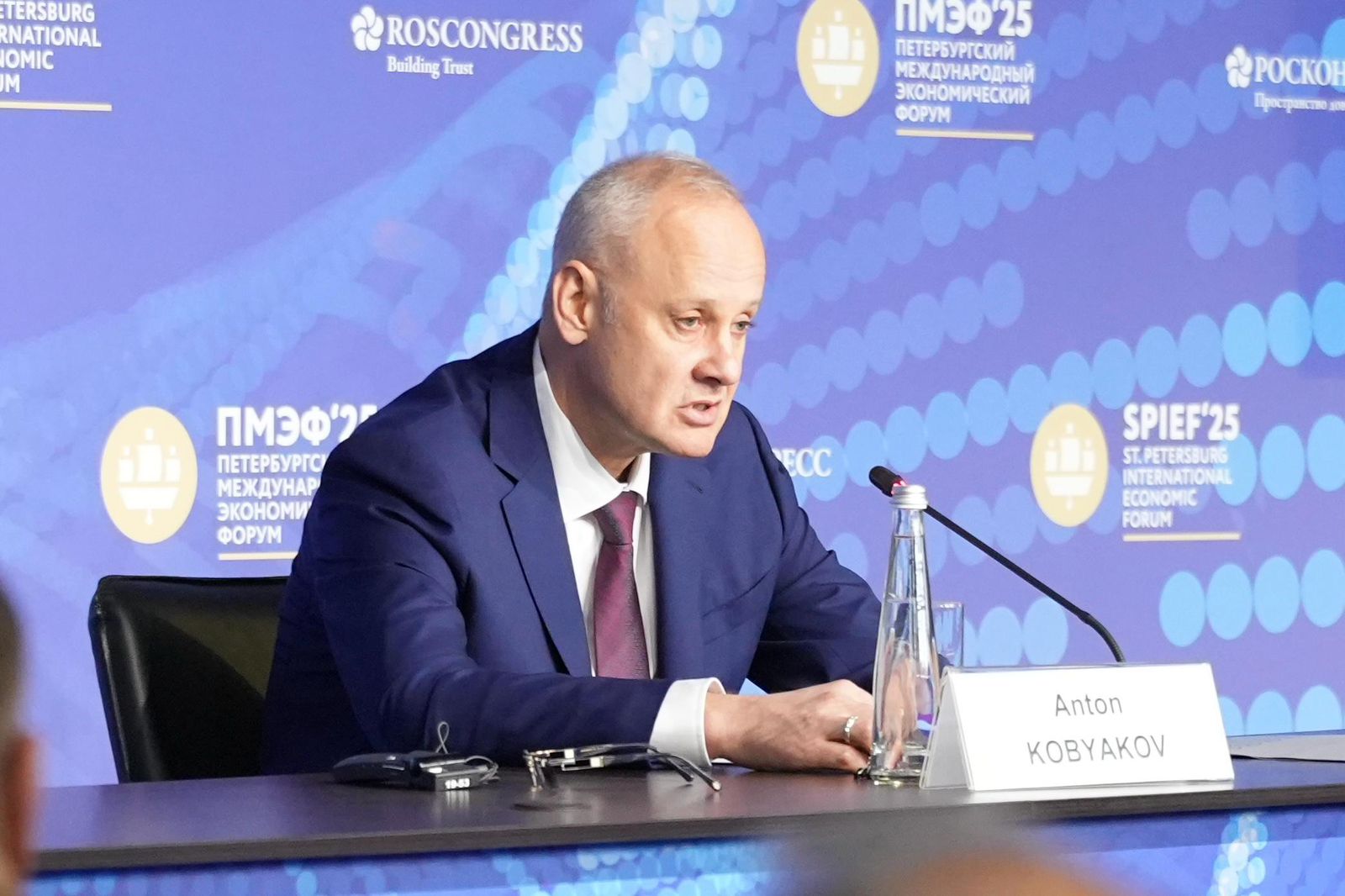
Anton Kobyakov
“The SPIEF is a reputable platform for global dialogue as a result of which common values, rather than political declarations or confrontation, are what could become the basis for a new structure of international relations, including in the economy,” Adviser to the Russian President and Executive Secretary of the SPIEF Organising Committee Anton Kobyakov said.
The slogan of the Forum was ‘Shared Values: The Foundation of Growth in a Multipolar World’, which set the framework for a comprehensive discussion. The participants of the event noted the importance of real sovereignty – political, economic, technological, as well as value-cultural. Such principles, according to experts and politicians, allow countries to go through difficult periods of transformation with minimal costs.
The main business programme as well as industry-specific and territorial venues featured more than 370 total events.
The business programme included 205 events, which were attended by more than 1,300 speakers and experts, including representatives of Latin America, the Middle East, Africa, and Asia.
The business programme sessions were structured into five tracks: ‘The Global Economy: A New Platform for Global Growth’, ‘The Russian Economy: A New Level of Growth’, ‘The Individual in a New World’, ‘The Living Environment’ and ‘Technology: Pursuing Leadership’.
The first track ‘The Global Economy: A New Platform for Global Growth’ featured more than 40 sessions, including 24 business dialogues.
The Forum devoted special attention to BRICS. The participants noted that BRICS currently makes up 45% of the world’s population, 26% of the planet’s territory, and 37% of global GDP in terms of purchasing power parity, which means that the Global South is becoming a new pillar of support for growth.
The expansion of BRICS, the accelerated rapprochement between Russia and major developing economies, and the revival of multilateral formats of cooperation are creating a stable framework of both economic and energy security. The focus has shifted from macro-stability to the architecture of new institutions. Representatives of BRICS countries, Iran, and Azerbaijan spoke about the establishment of polycentric, stable, and politically neutral platforms: from energy and trade to settlements and shipping.
The speakers noted that the Global South is strengthening its position in the emerging global energy order and is becoming a centre of new technological and institutional ties. Sustainable alliances and new principles of cooperation are emerging, and Russia sees strategic opportunities in this.
Russia and its partners from the Global South are building a new growth architecture – from expanding the share of BRICS countries in the global economy to launching sovereign transport corridors and technologically independent infrastructure projects. Experts emphasized that BRICS is moving from concepts to applied integration: settlements in national currencies, joint technology projects, and sustainable logistics routes.
Representatives of the Global South devoted extensive attention to food security issues. In particular, Forum guests from non-Western countries noted Russia’s role as a guarantor of global food stability.
During the discussions, experts also spoke about the need to build new relationships with international businesses that left Russia in 2022 and caused significant damage to the economy, but now want to return. Western companies must understand that there will be new working conditions, and this damage will have to be compensated.
This track also included sessions dedicated to the 80th anniversary of Victory Day and the Yalta and Potsdam conferences, at which new principles of the world order were formulated and Nazi organizations were banned. The session participants noted that these principles are being violated in the West today and that Nazism is gaining momentum.
More than 30 events were held as part of the second track ‘The Russian Economy: A New Level of Growth’. Experts noted that the economy not only needs to be reorganized, but structural and organizational measures must be implemented to manage it. It is essential to move from the liberal approaches of the 2000s to pragmatic management methods based on wartime priorities.
The Russian economy has adapted to these new conditions by strategically phasing out imports, prioritizing domestic goods in public procurements, and maintaining its technological sovereignty. The stronger position of the ‘Made in Russia’ brand, impressive agricultural and energy results, as well as domestic logistics are creating a sustainable growth model, where domestic demand is supported by greater exports and a mature quality control infrastructure. The participants discussed such new development support tools as dual-use startup lending, tax flexibility, state funds, and the expansion of agricultural opportunities. During the discussions, the speakers noted that Russia is strengthening investment proposals for the Northern Sea Route and inland waterways, which is creating a real alternative to southern routes, and continuing to institutionalize the Arctic with master plans, mortgages, and lists of support points that have been included in the Russian president’s instructions.
A new level of industrialization is impossible without the predictive training of personnel: the Ministry of Labour has prepared a forecast for the most in-demand professions by 2030. Digital platforms and drones require new regulatory and funding models, particularly in the dual-technology segment.
During the sessions of the track ‘The Individual in a New World’, participants noted that rapidly growing risks – from a demographic decline to mental health – are pushing states and businesses to “reassemble social institutions” and make health and inclusion support part of their economic policy. They also noted that demographics and the labour market need to be reconceptualized: social activity and good health counter the risks of isolation, while staffing shortages are being resolved through professional centres and flexible forms of employment. Education, mental health, and the preservation of cultural and linguistic heritage have become an integral part of the dialogue about the future.
Discussions were also held about problems with immigration, which is a crucial issue for both Russia and several other countries as well. To avoid social tensions, AI and robotics are needed, including dark shops, automated warehouses, ports, and road pavers. This all needs to be actively developed, imported, stimulated, and built in Russia.
Staffing shortages and the digital transformation of the labour market are forcing businesses and the government to invest in early career guidance, the modernization of professional standards, and preventative healthcare. Young people and flexible educational trajectories are key resources for growth.
The discussion focused on the needs of the workforce, culture, attention as a resource, preventive medicine, and the personalization of AI in healthcare. Particular emphasis was placed on the transformation of corporate culture and mentoring.
The thematic track ‘The Living Environment’ featured discussions about logistics, ecology, and territorial and infrastructure development. The participants paid particular attention to the Northern Sea Route, inland waterways, the urban environment, and housing in the North. Experts noted that the sustainability of territories and transport is becoming a strategic priority: the Arctic is turning into a year-round corridor, while regions and cities are rethinking tourism and infrastructure through the lens of comfort and safety. The Arctic and domestic Russian waterways are becoming key components of the new spatial economy. A comprehensive project for the development of the Northern Sea Route and the Arctic Transport Corridor, preferential mortgages in the North, and master plans for backbone cities all aim to enhance the country’s transport sovereignty, boost investment, and improve people’s quality of life.
The development of the Arctic requires investment in infrastructure and will definitely be a factor in Russia’s full-fledged pivot to the East. The inevitability of increased competition in the Arctic raises the question of a new ‘north-east state strategy’ for Russia.
Transport and climate projects are setting a new standard for environmental quality: roads are creating a migration map, while carbon forests and green offshores are becoming tools for competitiveness.
One of the key discussion topics in this track was the development of international transport logistics that takes into account changing trade corridors, including the Northern Sea Transit Corridor (NSTC). For this purpose, a new discussion format – the International Transport and Logistics Forum – will be launched in St. Petersburg in 2026 (approximately in April), where the priorities will include ensuring the safety of Russian transport routes.
The sessions of the ‘Technology: Pursuing Leadership’ track focused on major infrastructure and energy projects that require full technological sovereignty: high-speed highways, the modernization of the electric power industry, nuclear renaissance, and digitalization of healthcare.
The discussions touched upon drones, fintech, AI, outer space, as well as the regulation and financing of dual-use startups. Experts emphasized that Russia is relying on platform solutions, autonomous systems, and AI, as it seeks to translate its military and scientific superiority into civilian markets and solutions for everyday life.
Collective R&D and the funding of long-term university projects are driving this process. Atomic and quantum breakthroughs set the bar, and the financial market and new criteria for assessing science should support the export of technological expertise. Economic leadership often involves technological breakthroughs. The participants discussed how team coordination, standardization, and the systemic introduction of new products drive success in AI, healthcare, and industry.
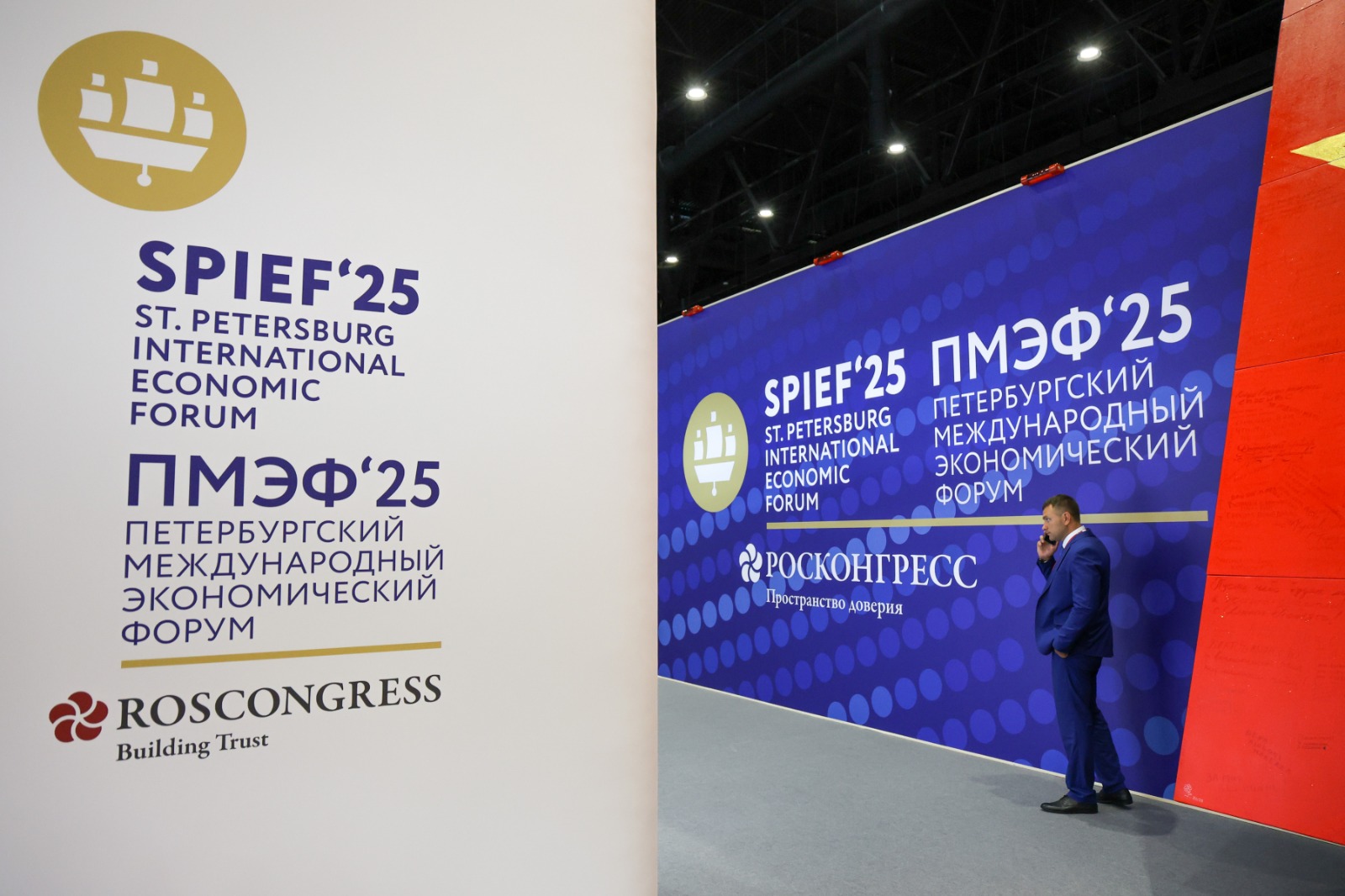
Industry Specific and Thematic Events
The following events took place as part of the SPIEF: the B20 Forum, the 10th anniversary edition of the SME Forum, the Ensuring Drug Security Forum, the Creative Industries Forum, and the General Assembly of the Organization of Asia-Pacific News Agencies (OANA).
The industry-specific and thematic events dedicated to international SME cooperation (36 sessions, 327 speakers) and drug security (17 sessions, 114 speakers) were attended by more than 2,350 representatives from 37 countries, including Russia.
SME Forum
The key event of the SME Forum was the plenary session ‘The Role of SMEs in Achieving New National Goals’. The speakers noted that digitalization, technology, and regional platforms stimulate the growth and modernization of SMEs, boost labour productivity, and help to create new jobs. The key focus was on raising awareness among entrepreneurs about support measures to provide access to financing and ensure the sustainability of SMEs.
‘Ensuring Drug Security’ Russian Pharmaceutical Forum
The ‘Ensuring Drug Security’ Russian Pharmaceutical Forum was held for the fifth time on the opening day of the SPIEF. The Forum was organized by the Roscongress Foundation with the support of the Russian Ministry of Health, the Russian Ministry of Industry and Trade, and the Committee on Health Protection of the Russian State Duma.
The Drug Security Forum featured 17 panel discussions. The Forum’s business programme events were attended by more than 1,500 participants from 15 countries.
The Healthy Life ecosystem organized 23 panel discussions on key healthcare issues, which took place in the halls of the SPIEF business programme as well as in the Healthy Life Area. Representatives of the public sector and the business community signed 30 cooperation agreements.
In 2025, the Forum launched new thematic platforms: the Roscongress International Cooperation Area and the thematic areas ‘Soul of Russia’, Agrocluster, and ‘Buy Russian!’.
Creative Industries Forum
The event programme included 15 sessions dedicated to creative industries that featured over 150 speakers. The discussion topics included the future of content and media as the world adapts to new formats, the impact of artificial intelligence on creative industries, the economy of creative industries, and the role of cultural heritage in the modern world. The first study by the Innosocium Foundation, which was prepared jointly with the Russian Public Opinion Research Centre, was presented during the Forum. The study is dedicated to how Russians perceive the key values, symbols, and meanings that make up the country’s ‘Soul of Russia’ cultural code.
SPIEF Academy
The project involved 50 participants aged 18 to 23. The programme consisted of a series of TED talks that were produced by Kinopoisk on 18–20 June.
The main topic was the question: ‘AI or Humans?’ Discussions were held with Russian and international speakers from the world of science, business, culture, technology, diplomacy, and space.
The following individuals expressed their opinions about the future of AI and the place of humans in it: Mikhail Kovalchuk, Sergey Krikalev, Alexey Aksakov, Dmitry Livanov, Anatoly Torkunov, Yevgeny Chebatkov, Natalya Popova, Alexey Repik, Pavel Marinychev, Vladimir Tabak, NJ Ayuk, Anastasia Ukolova, Stepan Kovalchuk, Alexandra Remizova, Boris Chernyshev, Vladislav Kuertov, Alexander Stuglev, Marat Ismagulov, Ivan Guz, Sergey Piven, Chen Liang, and others.
With the support of Alfa-Bank, a public talk was held with Chen Qiufan, a Chinese writer and screenwriter, and Kai-Fu Lee’s co-author of the bestseller AI 2041.
A meeting was also held with Deputy President of South Africa Paul Mashatile to discuss global challenges, youth development, and the role of dialogue.
‘Grilling CVs’ was a new event held in collaboration with Avito, during which participants went through a real personnel “roasting”, received feedback, and improved their career tracks.
Point Junior
The Point Junior discussion platform brought together 50 teenagers aged 14 to 17. The business programme featured five sessions, including open discussions, case studies, panel discussions, and business simulations. The events were attended by Russian Minister of Education Sergey Kravtsov, the rectors of Moscow State Institute of International Relations and Moscow Institute of Physics and Technology, Russian Federal Agency for Youth Affairs Director Grigory Gurov, as well as leading international experts. The discussion topics included responsible financing, the development of the video game industry, career design, and digital skills. The participants also took sightseeing tours, including a visit to the VK office and the ITMO campus. The programme ended with a case championship as part of the career lab.
Youth Track
The Forum devoted extensive attention to the youth audience. The ‘Day of the Future’ International Youth Economic Forum was held during the SPIEF, with the Friends for Leadership global network, which is accredited by the UN Economic and Social Council (ECOSOC), serving as a partner. The Forum was attended by more than 8,000 young leaders, entrepreneurs, experts, and representatives of all regions of Russia, more than 220 universities, and 60 scientific organizations. The Friends for Leadership international youth platform attracted representatives from more than 60 countries and specialized UN structures. Speakers from more than 20 countries, including representatives from Latin America, the Middle East, Africa, and Asia, took part in the Forum’s business programme.
Exhibition Space
The SPIEF Investment & Business Expo, which presents Russia’s investment, industrial, and innovative potential, was open for Forum participants and guests.
The exhibitors demonstrated their achievements in various fields and also introduced guests to specific preferences for investors.
The SPIEF Investment & Business Expo featured 27 stands and two pavilions that were united by the ‘Soul of Russia’ concept. Each exposition reflected special features, traditions, and the potential of the regions.
One of the largest expositions was the St. Petersburg stand, which had over 20 key projects. The conceptual idea of the stand was ‘St. Petersburg: A Metropolis of the 21st Century’.
The Moscow exposition was dedicated to key focuses of the capital’s development: the new Moscow medical standard, high-tech Moscow industry products, and transport innovations.
The Tatarstan stand, which was designed with folk motifs, featured product presentations by 13 major companies and organizations from the region.
The Krasnodar Territory’s stand emphasized the region’s tourism potential, the Komi Republic invited guests to the Yugyd Va National Park, and the Ryazan Region’s stand was dedicated to the 130th anniversary of poet Sergey Yesenin’s birth.
Highlights of the thematic expositions include the stand of the Kristian House of Family Traditions, which presented medals, a commendation list, and a decoration order for Vladimir Spiridonovich Putin, the Russian president’s father.
Surprisingly memorable expositions were presented by such industry leaders as Gazprom, Gazprom Neft, NOVATEK, Rosatom, and Lukoil.
The Russian Ministry of Energy’s stand provided a brief historical education with a timeline of the domestic energy industry displayed on a big screen: from the GOELRO plan to the heroic work of power engineers during the siege of Leningrad.
The Forum also hosted the ‘Faces of Science’ exhibition, a gallery featuring 23 portraits of leading Russian scientists: laureates of the Russian Presidential Prize in Science and Innovation for Young Scientists and other major scientific prizes, grant recipients of the Russian Science Foundation, participants in meetings with the Russian president on the sidelines of the Young Scientists Congress, as well as employees from Sirius University of Science and Technology and leading Russian scientific organizations.
VinoGrad
VinoGrad, another one of the Roscongress Foundation’s thematic platforms, was devoted to winemaking and viticulture. Experts from more than 40 leading wineries shared interesting facts from the history of winemaking, talked about the culture of wine consumption, and evaluated some of the best Russian wine brands. Over the course of three days, the platform hosted more than ten events, including a presentation of the full version of a unique cartographic project, the Wine Atlas of Russia, as well as a fashion show of Russian designers.
In addition, SPIEF participants were able to vote for the best Russian wine in three categories: still white, still red, and sparkling. The voting service was developed by the MARMA Lab team.
Healthy Life Area
The Russian Ministry of Health presented a stand within the Healthy Life Area for the first time. In addition, the Healthy Life Area debuted a new unique platform – the Healthy Nutrition Space, where visitors were introduced to a range of leading healthy food manufacturers and learned about the initiatives of the Russian Federal Service for the Oversight of Consumer Protection and Welfare to promote healthy nutrition among the population and about the ‘healthy shelves’ concept from retailers.
For the second time, the Healthy Life Area presented an interactive zone of the RC-Medicine Foundation – an expert platform that supports high-tech projects in healthcare that aim to promote innovative medical technologies in Russia and other countries.
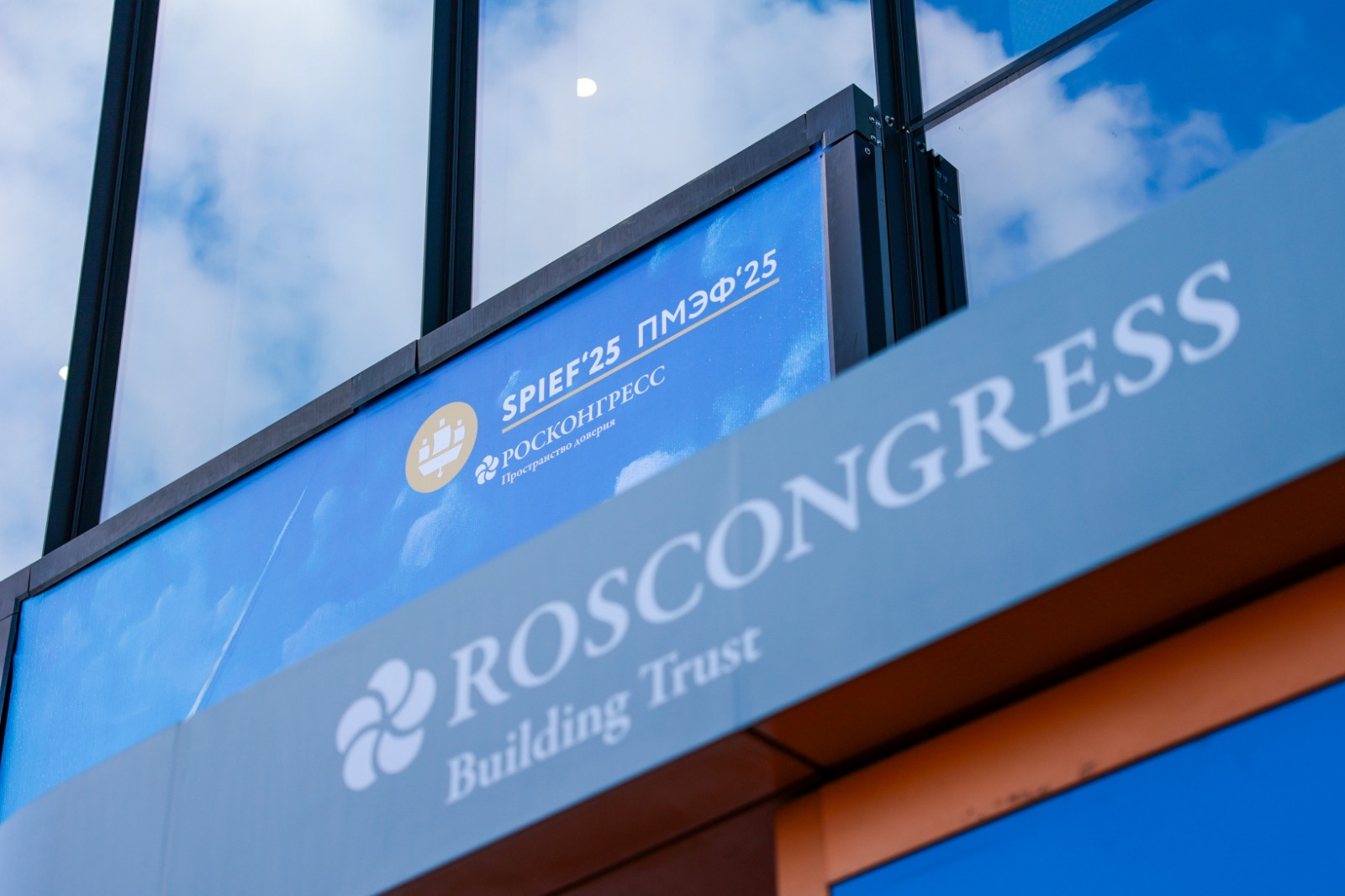
Roscongress Urban Hub
This international discussion platform, which was created by the Roscongress Foundation in partnership with DOM.RF, brought together major developers, system integrators, and prominent industry experts to discuss urban development issues and expand cooperation among businesses in urban planning. The main theme of the platform was ‘City Heritage’, where participants sought a balance between preserving heritage and innovative urban development, and also discussed macroeconomic challenges, opportunities for developers, the revival of small towns, strategies for developing key communities, and the use of innovative technologies in construction and design. URBAN Mag, a magazine about architecture and urban development, was presented for the first time at the SPIEF. It included interviews with leading experts and architects from the Netherlands, Italy, China, Qatar, and the UAE.
During the SPIEF 2025, the Urban Hub space hosted 14 sessions that were attended by roughly 700 people. The events were held with the support of the Russian Ministry of Construction, Housing, and Utilities. The strategic partner was DOM.RF.
Innovation Space
The Innovation Space, the flagship project of the Roscongress Foundation in science, technology, and innovation, once again impressed the audience with its scale at the SPIEF. Ten exhibitors presented their companies on an area of more than 1,000 square metres. The exhibitors included leading Russian technology companies and scientific institutions that brought their breakthrough developments to the Forum, for example, an innovative cancer treatment strategy from the St. Petersburg Federal Research Centre of the Russian Academy of Sciences and the large-scale Geokupol project in high-precision navigation of Moscow State University of Geodesy and Cartography. For its part, Positive Technologies hosted the Standoff international cyber battle, which featured 28 teams from 21 countries.
Companies in which the Roscongress Foundation participates as a co-investor were presented at the Innovation Space for the first time at the SPIEF 2025. These companies include the Pragmacore platform for managing investment and construction projects, the next-generation energy company Genmaster, and the creator of Hyper charging electric transport infrastructure.
In addition, the Economic Cooperation Space made its debut within the Innovation Space and brought together business community leaders who are interested in exchanging experience as well as inter-industry and international cooperation. The Innovation Space hosted a total of 17 discussions and seven agreement signings during the Forum.
New Exhibition Space
The Forum exhibition space grew by nearly 10,000 square metres this year, with 6,500 square metres inside the ExpoForum now home to an innovation cluster, healthcare space, the ‘Soul of Russia’, and an exhibition of Russia’s federal subjects and 3,500 square metres outdoors housing the new press centre.
Agrocluster
Another memorable premiere at the SPIEF 2025 was the Agrocluster thematic space, which is dedicated to the achievements and prospects of Russian agribusiness. The platform was organized by the Roscongress Foundation together with Russian Agricultural Bank, the Russian Ministry of Agriculture, and the country’s leading agricultural holdings. Its launch is timed to coincide with the 25th anniversary of Russian Agricultural Bank, which has played a key role in the transformation of domestic agribusiness over this period.
The Agrocluster presented six main achievements of Russian agribusiness since 2000 in greenhouses, winemaking, dairy, turkey and pork production, as well as fish processing.
‘Soul of Russia’ Pavilion
The ‘Soul of Russia’ is an umbrella project that plays a unifying role for representatives of more than 190 peoples and ethnic groups, Russians of different faiths, and Russian compatriots living abroad using a platform of unconditional values of social unity and shared responsibility for the well-being of Russia and the preservation of its people. The ‘Soul of Russia’ project is being implemented in the format of cultural, educational, and business events. The goal of the project is to translate traditions and heritage into a modern language that is understandable to children and young people through the filters of creative industries and socio-cultural technologies and to establish a generation of people who love their country and share its age-old values.
The space hosted presentations of creative industry projects that are being implemented in the regions of Russia, startups and enterprises that are reviving, supporting, and developing brands and crafts based on the cultural code, as well as works by contemporary Russian artists and designers.
The pavilion also featured a digital avatar of a girl that was developed by the art group Synticate together with the Tekhprosvet community on VKontakte. It was created using Naked-Eye technology, which allows you to see 3D images without special glasses.
The stand’s business programme included discussions, public talks, interactive excursions, and other events. Meetings were held by the Social Entrepreneurship working group of the Efficient and Competitive Economy Commission of the State Council of the Russian Federation as well as the working group on the development of creative industries and the acceleration of new Russian brands. An awards ceremony was held for the winners of the 7th Innosocium National Student Competition of Social Projects. A cyber session took place that was co-moderated by an advanced AI-equipped humanoid robot called Ardi.
The pavilion was set up by the Innosocium Foundation, the socio-creative platform of the Roscongress Foundation, with the support of the Presidential Foundation for Cultural Initiatives and Bank PSB.
‘Buy Russian!’ National Brands Space
The ‘Buy Russian!’ National Brands Space made its debut at the SPIEF. It was created by the Roscongress Foundation, VEB.RF, the Agency for Strategic Initiatives, and RWB (United Company Wildberries & Russ) to promote domestic entrepreneurship.
The platform hosted multiple events, but focused on 12 brands from participants in the ‘Know Our Own’ competition. In addition to them, other Russian fashion and watch brands were presented. The Russian Design Space exhibited contemporary design items, art objects, and products from leading craft brands in the lecture hall of the National Brands Space. The VEB.RF area demonstrated high-tech developments by Skolkovo residents.
Roscongress International Cooperation Area
The Roscongress International Cooperation Area is a unified networking space with a unique format for establishing business communication between representatives of government and public structures and the business and expert communities of Russia and other countries, as well as international organizations and integration associations.
The Cooperation Area ecosystem included stands of the Roscongress Foundation’s partners, a negotiation space, and a multifunctional hall for presentations, discussions, and the signing of cooperation documents.
The partners of the Cooperation Area include the Republic of South Africa with its national stand, the ASEAN Business Advisory Council, the Russia–ASEAN Business Council, the INVEST SAUDI brand of the Ministry of Investment of the Kingdom of Saudi Arabia, Promselkhozbank, the Indonesian Chamber of Commerce and Industry, the Conoscere Eurasia Association, and the TV BRICS International Media Network.
The venue hosted 12 thematic events in the format of discussions, presentations, and conferences, as well as the signing of more than 20 cooperation agreements.
Business Networking Platform
The Roscongress Foundation’s Business Networking Platform was open specially for SPIEF participants. Each year, it provides a service where people can search for and establish contacts, as well as reserve spaces to arrange business meetings. During the Forum, roughly 300 meetings were held on the Business Networking Platform.
Governors’ Club
The Governors’ Club is a special platform for business meetings and informal interaction between the heads of Russia’s regions, as well as presentations about the economic, tourist, and cultural opportunities of the regions.
Over the three days of the Forum, the Governors’ Club was visited by more than 40 heads of the country’s regions, as well as leaders, members of governments, and ambassadors of other countries. Over 130 meetings took place at the club and 17 agreements were signed between regional administrations and business entities.
Roscongress Partners’ Lounge
The Roscongress Partners’ Lounge at the SPIEF 2025 hosted over 20 meetings that aimed to strengthen business cooperation between the Roscongress Foundation, the top convention and exhibition organization in Russia, as well as major companies and the country’s regions.
Interactive Map of Russia’s Regions
Another unique item at the Forum venue was the Interactive Map of Russia’s Regions, a joint project between the Roscongress Foundation’s MARMA lab and the Chuvash Republic. It combines an object of cultural heritage – the Embroidered Map of Russia – and interactive technologies. This masterpiece of digital, decorative, and applied art revealed the identity and economic opportunities of each of Russia’s 89 regions.
The Country’s Human Potential
The Roscongress Foundation’s ‘The Country’s Human Potential’ ecosystem hosted a series of meetings and agreement signings with key partners concerning social and youth policy. The meetings strengthened the Foundation’s position as one of the leading participants in implementing the country’s social and HR agenda. As part of this initiative, work is underway to support young specialists, develop social inclusion, and shape the country’s human resources potential.
Roscongress Club
Per tradition, the Roscongress Club, a private club space that brings together senior representatives of the business community to work on issues related to business, social partnership, and the implementation of full-scale projects, was open at the SPIEF venue. Over three days, it hosted more than 60 meetings, as well as 12 high-profile events, including the signing of cooperation agreements between the Roscongress Club and its partners. The Roscongress Club partner network has grown by nine companies, which in the long term will expand the range of exclusive opportunities that are commensurate with the high status, success, and lifestyle of the club members.
Expert and Analytical Support
The Roscongress Foundation’s Information and Analytical System continued to develop its Summary service, which provides brief analytical recaps of discussions with descriptions of the key conclusions, problems, and solutions voiced during the discussions. The Foundation released cards with prominent quotes from key speakers at the SPIEF 2025 and key word clouds.
The materials were prepared with the unique InForum technological solution using artificial intelligence.
A report titled ‘Recap of the St. Petersburg International Economic Forum 2025’ will be prepared based on the Forum results. It will be available in electronic form in the Roscongress Foundation’s Information and Analytical System roscongress.org.
Expert and analytical support for the Forum was provided by representatives of leading Russian universities, including St. Petersburg State University of Economics, St. Petersburg State University, Lomonoso v Moscow State University, National Research University Higher School of Economics, Plekhanov Russian University of Economics, Peter the Great St. Petersburg Polytechnic University, North-West Institute of Management of the North-West Institute of Management RANEPA, Far Eastern Federal University, the Institute of Regional Economy Problems of the Russian Academy of Sciences, and the Directorate of Scientific and Technical Programmes.
As part of the SPIEF, experts from the ROSCONGRESS.ORG Information and Analytical System prepared a digest of analytical materials devoted to the most important comprehensive studies on the Forum agenda.
The Roscongress Foundation and its analytical partners specially prepared exclusive materials for the Forum dedicated to key issues on the event’s agenda:
Russia and Bahrain: Partnership Prospects
Greater Eurasian Partnership: Theory and Practice
‘New Russian Money’: Where Will the Digital Rouble Take Us
All the reports are available in the ROSCONGRESS.ORG Information and Analytical System.
The Roscongress Foundation and the Analytical Centre of the Russian Public Opinion Research Centre organized sociological support for the SPIEF.
This year, the Foundation’s research aimed to identify the opinions of Forum participants about key issues on the political, social, economic, and international agenda that were discussed at the SPIEF, as well as the Forum itself.
Sports Programme
The Forum served as a platform for international cooperation in sports, dialogue between sports and business, and the introduction of new formats of sport. The SPIEF sports games programme included competitions in 18 sports. Cyclists from seven countries – Russia, Belarus, Kazakhstan, Uzbekistan, the UAE, Syria, and France – took part in the ‘Gold of Ladoga’ multi-day cycling race. This project reached new heights, while combining a strong sports component and a presentation of the Ladoga region’s tourism opportunities. Corporate teams also took part in the race along with professionals for the first time. The Russian national badminton team played against Indonesia, one of the world leaders in this sport. Russian Minister of Sport Mikhail Degtyarev held working meetings with sports leaders from Hungary, Serbia, Indonesia, Bahrain, Kazakhstan, and Belarus.
Over 1,000 Forum participants took part in the sporting events. Russian Minister of Economic Development Maxim Reshetnikov ran a race, Kaliningrad Region Governor Alexey Besprozvannykh, Arkhangelsk Region Governor Igor Babushkin, and Head of Kalmykia Batu Khasikov played in a hockey tournament, Russian State Duma First Deputy Chairman Alexander Zhukov took part in a golf tournament, and Russian Ministry of Foreign Affairs spokesperson Maria Zakharova opened the Roscongress Basketball Cup. Vyacheslav Fetisov, Andrey Kirilenko, Andrey Arshavin, and other sports stars also competed with the Forum participants. Three-time Olympic Greco-Roman wrestling champion Alexander Karelin presented the ‘Choice of the Strong’ project.
The exhibition featured six sports stands: the Russian Ministry of Sports, Fonbet KHL Championship, the Boxing Federation, the Russian Football Union, the Russian Athletics Federation, and the ‘Choice of the Strong’ project. The partners of various events during the SPIEF sports games included Fonbet, Avito Travel, Teboil, G-Drive, AvtoVAZ, Avito Auto, Diplomatic Forum, REEF Residence, Sber Insurance, Healthy Fatherland, PSS, and Avtoban.
- Petersburg Seasons Festival of Culture
For the fifth time, the SPIEF hosted the St. Petersburg Seasons Festival of Culture, which combines special events of the evening programme and other events in St. Petersburg.
Throughout the Forum, on 18–22 June, participants had access to museums, theatres, and famous palaces in the suburbs of St. Petersburg, and could also take excursions of the Russian Geographical Society building and the Institute of Oriental Manuscripts of the Russian Academy of Sciences.
The ‘Russian Season’ catwalk show of Russian designers made its debut at the SPIEF and presented collections of designers from different regions of the country inspired by the national code of the peoples of Russia. The new ‘Russian Brand Space’ featured the exhibition ‘Russian Fairy Tales in the Works of Lacquer Miniature Artists’, where visitors could view works of the folk-art crafts Kholui, Palekh, Mstiora, and Fedoskino.
Per tradition, one of the highlights of the St. Petersburg Seasons Festival was the ‘Rhythm of Summer’ concert on Palace Square for the city’s residents and guests, which was attended by over 60,000 people. A Russian-Italian concert featured the Komnata Kultury, Alexandra Vorobyova, Al Bano, and Iva Zanicchi.
During the year of the 80th anniversary of Victory in the Great Patriotic War, the programme of the St. Petersburg Seasons Festival included exhibitions and special events to mark this date. On 22 June, the festival programme concluded with play Polyphony at the Komissarzhevskaya Academic Drama Theatre.
In addition, the famous Fedoskino factory presented the exhibition ‘The Great Patriotic War through the Eyes of Lacquer Miniature Artists’, which was dedicated to the 80th anniversary of Victory Day.
Partners
The SPIEF 2025 was held with the support of the Title Partners VEB.RF and Rosatom State Corporation. The Official Car of the Forum was TANK, the GigaPartner was Sber. The Strategic Partner was Rosseti, the Official Airline of the Forum was Aeroflot. The General Sponsor was VTB Bank. The General Partners included Gazprom, Gazprombank, Gazprom Neft, National Project Construction Group, NOVATEK, Faster Payments System, and Bank PSB.
The SPIEF 2025 was held with the support of: General Media Partner – Gazprom-Media Holding, General Television Partner – Russia 24 Information Channel, General International News Partner – Russia Today TV Channel, General Multimedia Partner – Izvestia Multimedia Information Centre, General Business News Partner – RBC, General Internet Partners – Gazeta.ru and Lenta.ru, and International Information Partner – China Media Group.
Information Partners were: Akhbar Al Khaleej and AL Watan (Kingdom of Bahrain), Oman Economic Review (Oman), Al Qahera News (Egypt), and Astro AWANI (Malaysia), NTV TV Channel, 360 TV Channel, TASS, RIA Novosti, Interfax Information Agency, Business FM Radio Station, Kommersant Publishing House, Komsomolskaya Pravda Publishing House, Argumenty i Fakty Publishing House, Vedomosti newspaper, Rossiyskaya Gazeta, Expert magazine, Shkulev Media Holding, News Media Holding, 1MI Holding, Dzen, Global Times (China).
The St. Petersburg International Economic Forum 2025 was held in St. Petersburg from June 18 to 21. The forum is organized by the Roscongress Foundation.

-

 Banking & Finance2 months ago
Banking & Finance2 months agoOman Oil Marketing Company Concludes Its Annual Health, Safety, Environment, and Quality Week, Reaffirming People and Safety as a Top Priority
-

 News2 months ago
News2 months agoJamal Ahmed Al Harthy Honoured as ‘Pioneer in Youth Empowerment through Education and Sport’ at CSR Summit & Awards 2025
-

 OER Magazines2 months ago
OER Magazines2 months agoOER, December 2025
-

 News1 month ago
News1 month agoAI Security Conference 2025 Hosted by Securado Highlights the Changing Cybersecurity Landscape
-

 Insurance1 month ago
Insurance1 month agoSupporting Community Wellness: Liva Insurance Sponsors Muscat Marathon 2026 with Free Health Checkups
-

 Interviews4 weeks ago
Interviews4 weeks agoEXCLUSIVE INTERVIEW: TLS Rebranding Marks Strategic Leap Toward Innovation, Sustainability & Growth
-

 Insurance3 weeks ago
Insurance3 weeks agoLiva Insurance Supports Community Wellness Through “Experience Oman – Muscat Marathon 2026”
-

 Banking & Finance3 weeks ago
Banking & Finance3 weeks agoA New Platform for SME Growth: Oman Arab Bank Unveils Tumouhi





























